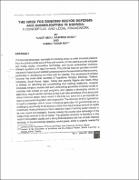The need for banking sector reforms and consolidation in uganda: a conceptual and legal framework
Abstract
The financial landscape, especially the banking sector, is under immense pressure from the global market place of financial services, for the need to provide adequate and cheap capital, competitive technology, and robust professional workforce efficient regulatory and legal frame work . This premise however provides services required in fostering and facilitating development in the real sectors of the economy, particularly in developing countries such as Uganda. This development paradox however has made other countries of Yugoslavia, Hungary ,Malaysia, Thailand, Indonesia, South Korea, Japan ,Turkey and recently Nigeria and South Africa to embark on reforming and consolidating their banking institutions. However anecdotal literature reveals that such undertaking generates immense benefit to countries that embark on such programs, and Uganda a developing country in east Africa, require similar exercise that it can take advantage of the strong and and vibrant financial sector, which would, in the long run, serve as a pre-requisite for regional economic integration, and cooperation. The discovery of oil in Uganda has brought paradigm shift in terms of revenue generation for governments and a challenging opportunity to the economy which now requires large amount of capital investment ; these phenomena have made this need of banking sector reforms to be very urgent and palatable, thereby making the country take advantage of the burgeoning revenue in the oil sector. The globalise economy is therefore in dire need of competitive capital and a strong financial sector that can provide financial services, in the increasingly globalise market place, which is urgently needed for growth and development of the economy of Uganda.

